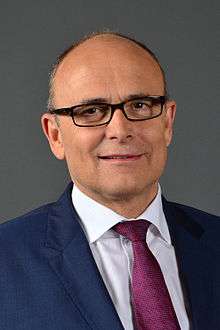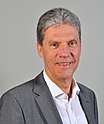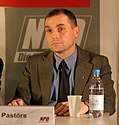2011 Mecklenburg-Vorpommern state election
The 2011 Mecklenburg-Vorpommern state election was held on 4 September 2011 to elect the members of the 6th Landtag of Mecklenburg-Vorpommern.[1] The incumbent grand coalition of the Social Democratic Party (SPD) and Christian Democratic Union (CDU) led by Minister-President Erwin Sellering retained its majority and continued in government.
| |||||||||||||||||||||||||||||||||||||||||||||||||||||||||||||||||||||||||||||
All 71 seats in the Landtag of Mecklenburg-Vorpommern 36 seats needed for a majority | |||||||||||||||||||||||||||||||||||||||||||||||||||||||||||||||||||||||||||||
|---|---|---|---|---|---|---|---|---|---|---|---|---|---|---|---|---|---|---|---|---|---|---|---|---|---|---|---|---|---|---|---|---|---|---|---|---|---|---|---|---|---|---|---|---|---|---|---|---|---|---|---|---|---|---|---|---|---|---|---|---|---|---|---|---|---|---|---|---|---|---|---|---|---|---|---|---|---|
| Turnout | 651,375 (51.5%) | ||||||||||||||||||||||||||||||||||||||||||||||||||||||||||||||||||||||||||||
| |||||||||||||||||||||||||||||||||||||||||||||||||||||||||||||||||||||||||||||
| |||||||||||||||||||||||||||||||||||||||||||||||||||||||||||||||||||||||||||||
Issues and campaign
Christian Democratic Union
The Christian Democrats 30-page election platform was called "clear and decisive".[2] The platform includes education policy, finances and population change.[3]
The Christian Democrats campaigned with the slogan "C wie Zukunft" ("C for Future"). This was intended to link the first letter of both the party's and the frontrunner Lorenz Caffier's name with the positive term "future". However, recipients understood that the CDU suggested to write the word "Zukunft" with a "C". This earned the conservatives scorn and derision.[4][5]
Social Democratic Party
Social Democrats focused on issues of economy, labor, energy change, social justice, family and education.[6]
In the government SPD plans same time to cancel the tax release of the hotels and restaurants with a value of 1.7 billion euros, collect 2 billion euros by the higher peak tax and further 1.7 billion euros by increase of the nuclear plant fuel tax.[7]
The Left
The Left platform includes employment and economic rights, social justice, environmental protection and more democratic participation.
Parties
The table below lists parties represented in the 5th Landtag of Mecklenburg-Vorpommern.
| Name | Ideology | Leader(s) | 2006 result | |||
|---|---|---|---|---|---|---|
| Votes (%) | Seats | |||||
| SPD | Social Democratic Party of Germany Sozialdemokratische Partei Deutschlands |
Social democracy | Erwin Sellering | 30.2% | 23 / 71 | |
| CDU | Christian Democratic Union of Germany Christlich Demokratische Union Deutschlands |
Christian democracy | Lorenz Caffier | 28.8% | 22 / 71 | |
| Linke | The Left Die Linke |
Democratic socialism | Helmut Holter | 17.3%[lower-alpha 2] | 13 / 71 | |
| FDP | Free Democratic Party Freie Demokratische Partei |
Classical liberalism | Gino Leonhard | 9.6% | 7 / 71 | |
| NPD | National Democratic Party of Germany Nationaldemokratische Partei Deutschlands |
Neo-Nazism | Udo Pastörs | 7.3% | 6 / 71 | |
Opinion polling
| Polling firm | Fieldwork date | Sample size |
SPD | CDU | Linke | FDP | NPD | Grüne | Others | Lead |
|---|---|---|---|---|---|---|---|---|---|---|
| 2011 state election | 4 Sep 2011 | – | 35.6 | 23.0 | 18.4 | 2.8 | 6.0 | 8.7 | 5.6 | 12.6 |
| Forschungsgruppe Wahlen | 22–25 Aug 2011 | 1,349 | 35 | 28 | 16.5 | 4 | 4.5 | 8 | 4 | 7 |
| Infratest dimap | 23–25 Aug 2011 | 1,000 | 36 | 26 | 17 | 4.5 | 4.5 | 8 | 4 | 10 |
| Forsa | 15–18 Aug 2011 | 602 | 34 | 27 | 17 | 5 | 5 | 7 | 5 | 7 |
| Infratest dimap | 12–17 Aug 2011 | 1,000 | 37.0 | 28.0 | 17.5 | 3.5 | 4.0 | 7.0 | 3.0 | 9.0 |
| Emnid | 8–11 Aug 2011 | 1,000 | 34 | 28 | 19 | 4 | 4 | 7 | 4 | 6 |
| Emnid | 29 Jul–4 Aug 2011 | 1,007 | 34 | 29 | 19 | 3 | – | 7 | 8 | 5 |
| Infratest dimap | 29 Jul–2 Aug 2011 | 1,001 | 34 | 30 | 18 | 3 | 4 | 8 | 3 | 4 |
| Infratest dimap | 24–28 Jun 2011 | 1,000 | 34 | 30 | 17 | 4 | 4 | 8 | 3 | 4 |
| Infratest dimap | 8–11 Apr 2011 | 1,001 | 34 | 27 | 20 | 3 | 3 | 10 | 3 | 7 |
| Emnid | 25 Feb–1 Mar 2011 | 1,000 | 34 | 29 | 17 | 5 | 4 | 6 | 4 | 5 |
| Forsa | 3–6 Jan 2011 | 601 | 32 | 29 | 15 | 6 | 5 | 8 | 5 | 3 |
| Infratest dimap | 11–13 May 2009 | 1,000 | 25 | 32 | 22 | 10 | 4 | 5 | 2 | 7 |
| polis+sinus | 1–16 Dec 2008 | 1,205 | 27 | 30 | 23 | 11 | 4 | 3 | 2 | 3 |
| Infratest | 8–11 Oct 2007 | 1,000 | 34 | 32 | 17 | 7 | 4 | 3 | 3 | 2 |
| Forsa | 20 Aug–18 Sep 2007 | 1,009 | 28 | 31 | 18 | 9 | 7 | 3 | 4 | 3 |
| 2006 state election | 17 Sep 2006 | – | 30.2 | 28.8 | 16.8 | 9.6 | 7.3 | 3.4 | 3.9 | 1.4 |
Election result
The Social Democratic Party (SPD) were the clear winners of election with 35.7 percent of the votes. It increased 5.5 percentage points over the last election in 2006. The Christian Democratic Union (CDU) support fell by 5.7 percent, ending up with 23.1 percent.[8] The Free Democratic Party (FDP) got only 2.7 percent of the vote, a massive drop of 6.9 percent compared to the last election, when it received 9.6 percent.[9] The FDP failed to qualify for the Landtag for the fifth time in the last six state elections.[10] The FDP Chairman Philipp Rösler claimed responsibility for failing to qualify for the Landtag.[11] The Green Party reached the 5% minimum and qualified for the first time in Landtag of Mecklenburg-Vorpommern.[10] The Greens have now seats in all of Germany's 16 state parliaments.[9]
The far right National Democratic Party (NPD) won in excess of 30% of the votes in 2 of the districts in this election and 26% to 29% in some communities near Anklam and Torgelow.[12] In Koblentz, the NPD finished 15% higher than the CDU and the SPD.[12] Leaders of some of the parties have come out and stated their opposition and shock at the success of the NPD. Rösler also stated that "it is shocking that the radical right-wing NPD has received twice as many votes as the FDP".[11] SPD leader Erwin Sellering wasn't happy about the NPD re-entering the Landtag and stated "It’s a shame that they’ve made it in again and very regrettable".[13]
Summary of the 4 September 2011 election results for the Landtag of Mecklenburg-Vorpommern
| Party | Votes | % | +/- | Seats | +/- | Seats % | |
|---|---|---|---|---|---|---|---|
| Social Democratic Party (SPD) | 242,251 | 35.6 | 27 | 38.0 | |||
| Christian Democratic Union (CDU) | 156,969 | 23.0 | 18 | 25.4 | |||
| The Left (Linke) | 125,528 | 18.4 | 14 | 19.7 | |||
| Alliance 90/The Greens (Grüne) | 59,004 | 8.7 | 7 | 9.9 | |||
| National Democratic Party (NPD) | 40,642 | 6.0 | 5 | 7.0 | |||
| Free Democratic Party (FDP) | 18,943 | 2.8 | 0 | 0 | |||
| Pirate Party Germany (Piraten) | 12,727 | 1.9 | 0 | ±0 | 0 | ||
| Family Party (Familie) | 10,538 | 1.5 | 0 | ±0 | 0 | ||
| Others | 14,773 | 2.2 | 0 | ±0 | 0 | ||
| Total | 681,375 | 100.0 | 71 | ±0 | |||
| Voter turnout | 51.5 | ||||||
Notes
References
- "SPD and Greens set for power in Hamburg". The Local. February 13, 2011. Retrieved February 13, 2011.
- "CDU: "Klar und entschlossen" in den Wahlkampf". NDR.de. 21 May 2011. Retrieved 5 September 2011.
- "Caffier will in Staatskanzlei". Norddeutsche Neueste Nachrichten. Archived from the original on 4 September 2012. Retrieved 5 September 2011.
- ""C wie Zukunft" – CDU wird für Wahlp lakat veräppelt", Der Spiegel (in German), 26 July 2011, retrieved 16 Aug 2011
- "C wie Zukunft", Die Welt (in German), 27 July 2011, retrieved 16 Aug 2011
- "Sellering erwartungsgemäß Spitzenkandidat". NRD.de (in German). 14 May 2011. Retrieved 5 September 2011.
- "SPD plant massive Steuererhöhungen". Der Spiegel (in German). 4 September 2011. Retrieved 7 September 2011.
- Smith, David Gordon (5 September 2011). "'Germany's Social Democrats Are Back'". Der Spiegel. Retrieved 7 September 2011.
- "Merkel's CDU Suffers Setback in State Election". Der Spiegel. 5 September 2011. Retrieved 7 September 2011.
- "'Something is deeply wrong when the NPD is more successful than the FDP'". The Local. 5 September 2011. Retrieved 5 September 2011.
- "Schuld sind nur die regionalen Themen". Süddeutsche Zeitung. 5 September 2011. Retrieved 6 September 2011.
- "Wo ein Drittel der Wähler für die NPD stimmt". Die Welt (in German). 6 September 2011. Retrieved 6 September 2011.
- Fox, Holly (5 September 2011). "Far-right party strengthening its influence in eastern Germany". Deutsche Welle. Retrieved 6 September 2011.



